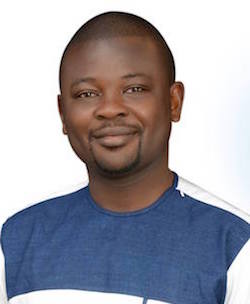 Henry Kyeremeh
Henry Kyeremeh
Economic Officer
Debt Management Division
Ministry of Finance, Ghana
Public Policy Program (’09)
Please tell us about your career path so far. What is your area of specialization and how did you come to work in this area?
I have over ten years of work experience in the provision of public service in Ghana. I did my mandatory national service with the Ministry of Finance (MOF) in the year 2005 and was subsequently employed as Assistant Economic Officer. At that time, I was assigned to assist in the management of the Ghana-Spain/Denmark economic cooperation. In 2008, I had the opportunity to study at GRIPS for a Master of Public Policy degree. Upon completion of my studies at GRIPS in the year 2009, I returned to my job at MOF. My commitment to continue providing public service has kept me at MOF despite several lucrative opportunities that have come my way since my return from Tokyo.
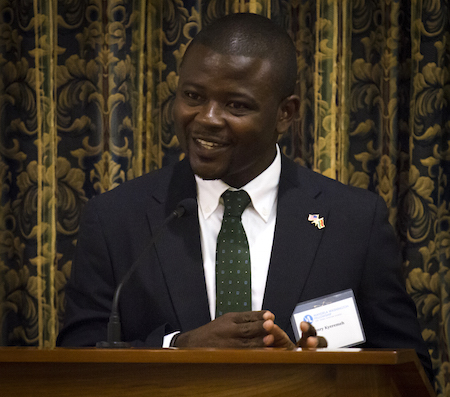
Henry delivering Welcome Address at the University of Maine, USA
I was posted immediately to the External Resource Mobilization, Bilateral Division (ERM-B) in 2009 when I resumed work. The ERM-B Division is part of the Finance Branch of the Ministry and has the primary responsibility of mobilizing financing from Ghana’s Bilateral Development Partners in the form of grant and concessional loans towards financing of central government budget. I was specifically assigned to the European Bloc comprising countries of France, Germany, the Netherlands and Sweden (FGNS). My primary responsibility was to assist in the coordination, engagement and management of economic cooperation between Ghana and the FGNS countries. The FGNS has a portfolio of about 1.5billion USD in the form project and programmes. The projects/programmes I worked on span from healthcare to road, drainage, water provision and market infrastructure. I spent a significant part of my career engaging in economic diplomacy, particularly on bilateral cooperation up until January 2016, when I was reassigned to the Debt Management Division (DMD).
I have also been a member of numerous technical working groups and have worked on different public policy papers including; the Ghana Medium Term Debt Management Strategy – 2013 to date, reports on Debt Sustainability Analysis (DSA) – 2013 to date, Committee on deployment of Aid Information Management Platform (AIMS) – 2012-2015, Committee for drafting of Ghana Aid Strategy now known as Ghana Development Cooperation Strategy -2010-2015, and a task force for coordination of International Aid Transparency Initiative (IATI).
You are currently an Economic Officer with the Debt Management Division of the Ministry of Finance. What are your main responsibilities and duties?
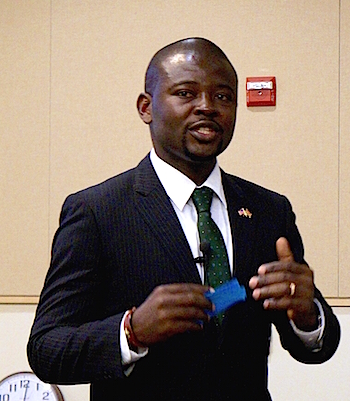
Henry delivering “IGNITE TALK” on Equality, the role of Leadership
I’m currently an Economic Officer with the Debt Management Division (DMD). My responsibilities primarily cover conducting credit risk analysis on entities seeking central government support in the form of guarantees and credit. Basically, we conduct entity level analysis to establish the exposure level of government in the form contingent liabilities arising from issuance of guarantees and on-lending to State Own Enterprises (SOEs). The things I’m working on currently include; drafting of credit risk guidelines, drafting of risk assessment methodology and risk quantification methodology. I also assist in the production of the central government public debt report (produced once a year), public debt analysis reports, and carrying out medium term debt management strategy as well as debt sustainability analysis.
In your current capacity, what do you see as the main opportunities and challenges for Ghana over the course of the next five to ten years?
The opportunities vary from stable democracy, reliable educated work force to governmental level commitment to fiscal rectitude and solid legal and law regime. The medium term prospect of Ghana’s economy is very bright. The bright future is anchored on prudent macroeconomic reforms programme(s) the government is currently implementing with the support of the International Monetary Fund. The reforms are expected to help restore confidence in the economy. Political commitment to restoring confidence in the economy is apt and the determination of public officials at various stratas to work for the turnaround of the economy is striking. The challenge has to do with sustaining the public debt at reasonable levels in the wake of continuous depreciation of the Ghanaian currency. The need to also align fiscal policy with monetary policy decision appears to have a gap.
Pursuing a fiscal policies reform agenda, which anchors public debt, public expenditure curtailment, value addition to its raw materials and deepen confidence in the economy should be more than enough to leap Ghana into reaching the upper middle income status.
What are some of the biggest challenges you face in your work? And what have been the most interesting or rewarding aspects of your career thus far?
To me, beneath every challenge is an opportunity. I’m most of the times positive about any situation and I explore the positive side of any challenges I have faced at the work place. I normally do not dwell much on the challenges since they are often short-lived.
I think my career in the public service has been a very interesting one. Even when I was a junior officer, I was given the opportunity to participate in key activities of the Ministry. Through that I was able to learn quickly and build my confidence. I have since been an integral part of the middle level technical resource hub of the Ministry. What gives me much joy is when I see some of the critical infrastructure that I contributed to in getting established. I have also been able to build a solid network of business men, political leaders and private sector actors.
You were a recipient of the prestigious 2016 Mandela Washington Fellowship for African Leaders. Please tell us more about this fellowship.
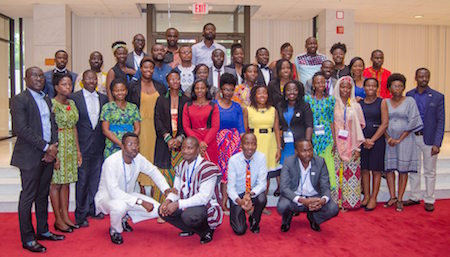
Ghanaian MWF Fellows at a reception hosted by the Ambassador of Ghana to the USA, Ambassador Henry Smith
The Mandela Washington Fellowship (MWF) for Young African Leaders is the flagship programme of President Barack Obama and is designed to prepare identified young Africans for leadership tomorrow.
The programme presents an opportunity for participants to hone their leadership skills and to network with other young leaders from sub-Saharan Africa and the United States. After academic residency at selected universities in the States, participants get the opportunity during a three-day Fellowship Summit hosted by President Obama to interact with Obama, key US government officials and business leaders. I am deeply humbled to have been selected after a rigorous selection process.
You have just finished a 6-week venture in the U.S. as part of the fellowship program. Please share some of your experiences and highlights with us.
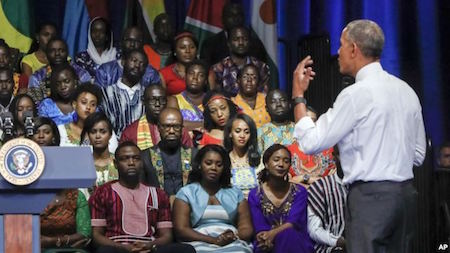
President Obama delivery his speech at the Presidential Summit (photo by AP)
I guess, all participants were very much looking forward to the presidential summit. It’s a great and ecstatic feeling to be hosted by the president of United States and even have an opportunity to question him directly on any issue of your interest. It was indeed the most epic moment of the whole fellowship program and as usual Obama was witty, apt and captivating in his delivery. He delivered and made a powerful case for Africa and why we (YALI fellows) should not fail to provide the much-needed leadership of tomorrow for Africa. I was humbled by his humility and yet his forceful views. I could not fathom that standing before us was the most powerful man on earth, yet very humble and jovial.
But, I think the academic package is awesome. The content is carefully thought through and designed to meet the needs of most of the challenges we (Africa) faces today. I’m particularly mesmerized by one particular course called Innovation Engineering. The notion behind the course is to help students transition their ideas into innovation, communicate that innovation and finally commercialize that innovation. The concept is applicable to all facets of our lives.
I also had the opportunity to interact with Governors of various States and key political officials. I was also able to visit key landmark areas such as Bar Harbor, hiking on the Acadia mountain, borestone mountain and many more.
What led you to GRIPS? What was the most important thing you learned while here, and how has your experience at GRIPS prepared you for future endeavours?
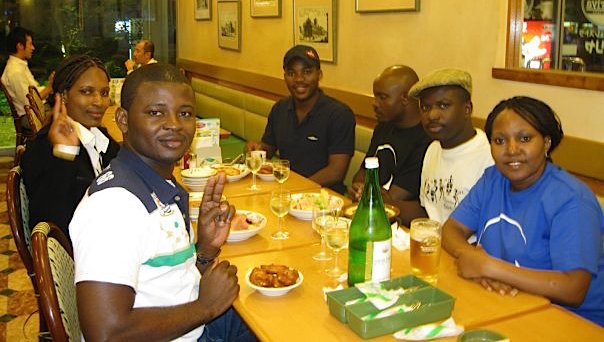
Henry with his GRIPS African colleagues at Saizeriya, Tokyo, 2009
I think, I chose GRIPS primarily on the fact that the course content met my needs. I had carefully looked at the course content and the faculty and noticed it had been designed to meet the needs of mid-career officials. Prior to coming to GRIPS, I had had other opportunities at Chuo and Hiroshima Universities but turn them down.
GRIPS education challenges you to think outside the box. It allows you to hone your policy design skills. GRIPS has broadened my horizon and introduced me to a variety of policy tools and also skills to analyze such policies. So, in whole GRIPS education has helped to build me solidly in the technical sense. I also had the opportunity to build a solid network of professionals from across the world. This network has become a great resources hub for me.
The principles leant during my study at GRIPS have helped me so much in my career. The principle of discipline, rectitude, and hard work have pushed me this far. I can only imagine how relevant these principles would be when I transition into the next phase of public service.
How do you maintain a balance between your work and the rest of your life? And what is your favorite thing to do when you are not working?
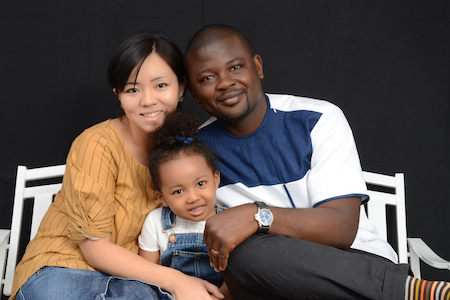
Henry with his family; Aya and Baby Kate
When I’m not working, I spent most of my time with my family. God has blessed my wife and I with one daughter and I love spending my leisure time with her.
I also do voluntary work with some universities in Ghana. I’m currently a career coach for a number of final year university students. I occasionally organize lectures on topical economic/social issues for them. I also help them in identifying their career path. Also, I again volunteer with a lot of social groups to provide care for the aged, the physically challenged and the downtrodden.
What are some of your fondest memories of your time spent at GRIPS? And what do you miss about Japan?
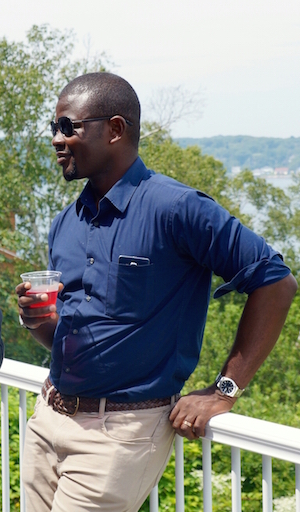
Reception at Ambassador Pamela White’s Beach home, Maine
There are many fond memories of my time in Japan. I had an amazingly wonderful time of my life during that period. Our monthly AFRO Parties held at TIEC were wonderful. It allowed us, Africans, to interact with people from all walks of life. It bonded us together and from there we drew our strength to keep going especially when we were home sick.
I think I miss more the wonderful and warm people of Japan, especially the wonderful staff of GRIPS. They were highly efficient and proficient at their duties. I sometimes wonder about where they drew their strength from.
I also miss the funful nightlife of Tokyo. We occasionally experienced the buzzing Tokyo life at night. They were crazily fun!
If you could give one piece of advice to anyone considering studying at GRIPS what would it be?
I will say, GRIPS is a wonderful place to study. It presents to students the opportunity to deepen their appreciation and understanding of economic theories, public policy development and economic models. You will also have the distinguished honour of studying in a prestigious school which is at the forefront of different disciplinary studies and research.
Your personal and professional life will be transformed for the best should you take up studying at GRIPS. It has one of the finest faculty’s and modern facilities to aid your study. The GRIPS experience will define and always challenge you to strive for the best in whatever endeavor you undertake. The GRIPS way!
How would you like to maintain involved with the School? What do you expect from GRIPS as an alumnus and o you have any suggestions on how to further utilize the GRIPS alumni network?
I think GRIPS is a global institution in the sense that it has alumni across the world. They are a wonderful resource from which the Institution can draw from. Fortunately, most of them are at influential positions. They could be invited to share their experience and inspire the current students through GRIPS forums and special presentation times. We could also strengthen our regional branches.
Offering opportunities to interested alumnus to come back to GRIPS for further studies and to collaborate with faculty in academic publications will strengthen the bond between the alumni and GRIPS.




